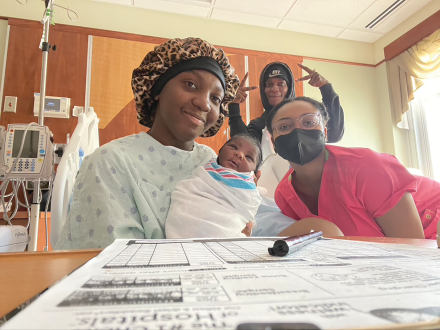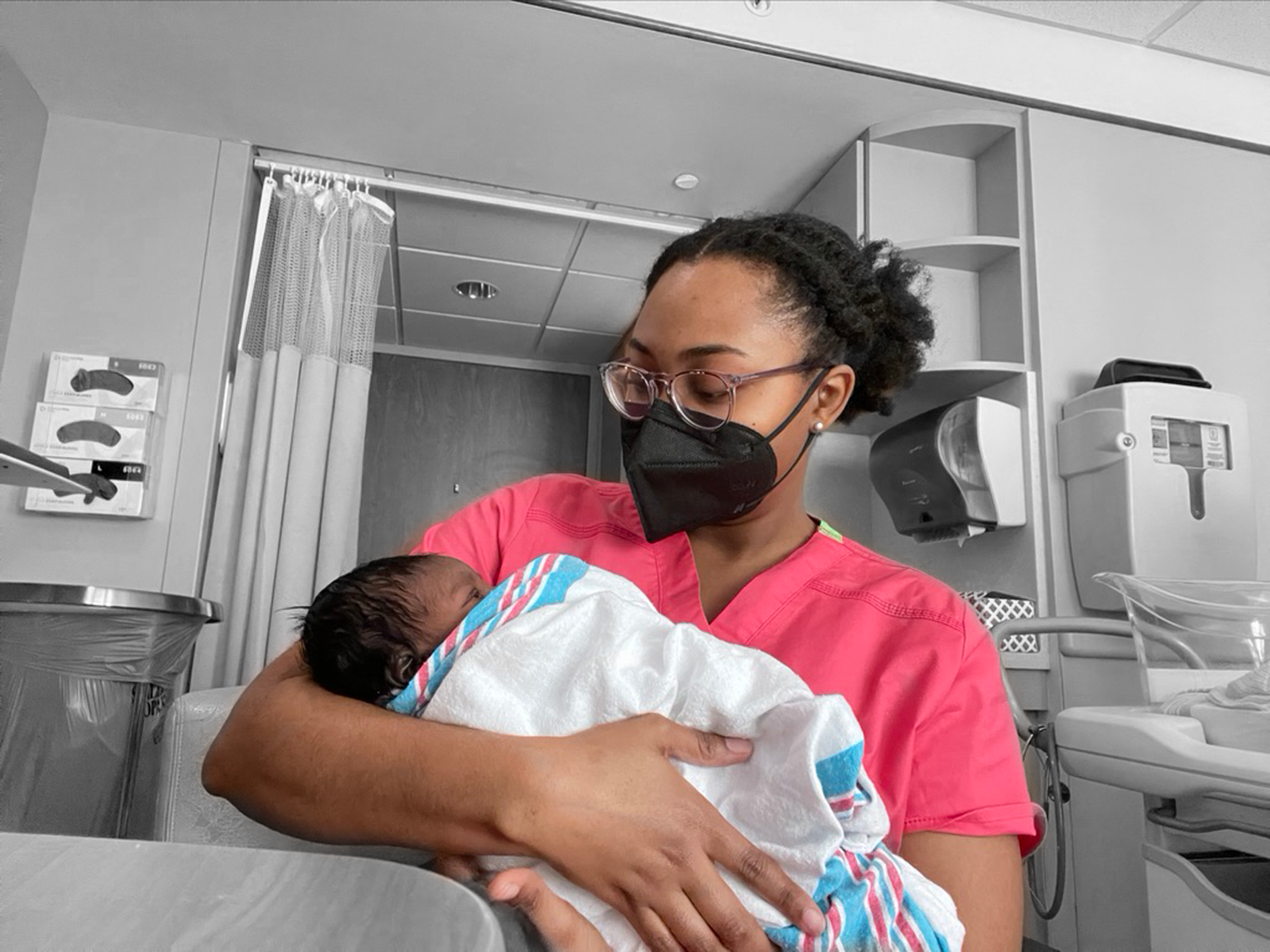Empowered by knowledge from her public health research, Queen Assata Stephens ’22 became a certified doula, established a business and assisted in two births — all before graduation.
Queen Assata Stephens’ phone rang just before 3 a.m. on a frozen February night, the voice on the line urgent: early labor pains, the baby is coming, please hurry.
This was the moment she’d planned for with the expectant family. Just a few months before, Stephens had been certified as a doula — akin to a nonmedical birthing coach — and started her own business, The Doula Queen, to support expecting mothers and families and advocate for their care. This would be her second delivery as a doula and the first on her own. But first she had to get there.
As her classmates slept, she dressed in scrubs, pulled on her coat and prepared for the four-hour drive to the client’s Virginia home. Rushing to her car, she found its doors frozen shut from a light rain the day before. Trying them all, she pried one open, climbed inside and started the engine. Time racing, she buckled in and set off. At cruising speed on the highway a few minutes later, a suddenly unfrozen rear door swung open, forcing her off the road.
“I was so frantic,” Stephens recalled, laughing. “As a doula, you’re supposed to be the calm one, and so many things were happening on the way there. I really had to concentrate on calming myself before I entered that space because I was there to support her.”
Cool and collected, she arrived before late-stage labor and in time to begin aromatherapy and administer massages to the client.
“Each time the nurses came in, they would say, ‘Oh, I love this ambiance,’ and ‘I wish I had this when I had my child,’” Stephens says. “The whole point of being a doula is for the client to have the education to make informed decisions about what they want and advocate for them. When I asked later how she felt about her birth experience, she told me that everything happened the way she wanted and, ‘I’m grateful you were there with me throughout the labor because I wouldn’t have been able to make it without you.’”
It’s safe to say that aspects of Stephens’ senior year didn’t resemble those of most of her peers.
She graduated May 20 with a degree in public health studies and an arsenal of information she plans to use to make health care more equitable and accessible. Her studies and relationships with faculty empowered her to complete doula certification while researching the Black maternal health crisis, preparing for conference presentations and leading two campus student groups: the Black Student Union and Melanated Melodies, an a cappella group she founded for Black singers on campus. Amid all that, she found time to establish her business and assist in two births. She plans to apply to Bastyr University’s Master of Science in Midwifery program while working with clients and birthing centers as a doula.
Finding the path
Stephens arrived at Elon in 2018 planning to major in biology for a career as a neonatal nurse practitioner. Her affection for infants began early, when she would proudly proclaim that she was going to “be a baby-doctor.” She later entertained ideas of becoming a pediatric surgeon and physician assistant. “I never strayed from the idea of caring for children,” Stephens says. “That’s what I was passionate about.”
But in first-year courses, she realized that biology wasn’t the right fit. Through different discussions, Stephens was introduced to Associate Professor of Public Health Studies Stephanie Baker, who co-founded the Health, Equity and Racism Lab with Assistant Professor of Public Health Studies Yanica Faustin. The lab aims to address area health disparities while examining health care systems and outcomes in marginalized communities.
Baker explained to Stephens that she could take different routes to becoming what she wanted to be. “I took Dr. Baker’s introduction to public health class, and I knew: This is it,” she recalls. “If I hadn’t gone into public health, I don’t think I would be where I am today in understanding my career path. It was great for me.”
Baker recalls immediately being impressed by Stephens’ drive. “She was so visionary and excited about the legacy she could leave at Elon. I’d never met a first-year student who was that ambitious,” Baker says. “All of the things she said she wanted to do, she made them happen.”
In January 2020, Stephens enrolled in Faustin’s Maternal and Child Health Equity course. A grim fact underscored the syllabus: Black women in the U.S. are nearly four times more likely to die in childbirth than White women. “I’m a doula because of Dr. Faustin,” Stephens says. “If there’s a solution to the Black maternal health crisis, I’m going to be part of that solution.”
The maternal death rate in the U.S. is the highest among developed nations at 17.4 deaths per 100,000 births, according to the Centers for Disease Control, which also concludes that 60% of those deaths are preventable. On average, the maternal death rate for non-White women is three times greater than for White women.
Not listening to Black women when they’re in pain — Serena Williams went through that, Beyoncé went through that — makes the advocacy part of being a doula really important.
Socioeconomic factors and access to prenatal care influence these disparities but cannot alone account for the drastic differences in childbirth outcomes. Even when Black mothers have access to prenatal care in all three trimesters, the quadrupled death rate remains. Public health experts have come to see that racism — embedded in health care systems, nurturing implicit bias among providers, the root of historical mistreatment of Black Americans by the medical community, and patients’ apprehension of racial discrimination — is the cause of this disparity.
Faustin’s course pointed to clear solutions. The risks of maternal morbidity decline significantly when doulas and midwives are involved in prenatal care and delivery.
Along with researching the disparities in health care for Black mothers, Stephens began pursuing her doula certification through an organization that worked with the Alamance County Health Department. That group paused when the pandemic began. In June 2021, Stephens completed training and was certified through WISE Community Doulas, which aims to increase access to doulas among underserved and marginalized communities.
“Queen Assata is creative, passionate, intellectually curious, an activist and an advocate,” Faustin says. “She certainly is a leader and not afraid to dream big and be a trailblazer. Connecting the dots between these lived experiences and health inequities, particularly maternal health inequities, and adding more contextual knowledge from various fields ignited a spark in her. Her outrage over the health inequities was clear and her desire to be a part of a solution was something she expressed as well.”
Demystifying and de-medicalizing birth
Doulas educate, advocate for and provide emotional and physical support to clients during childbirth. They are not medical providers. Midwives often work alongside OBGYNs to ensure mothers have the care they need. Some midwives are certified nurses with graduate degrees.
Midwives and doulas can be especially beneficial during childbirth by advocating for Black women, who more often report not feeling heard by physicians. Tennis star Serena Williams’ recent case, in which she warned doctors of her history of blood clots, told the medical team that she felt something was wrong, then self-diagnosed and nearly died of a pulmonary embolism after giving birth, is now frequently referenced by advocates for equitable treatment of Black mothers.
“Not listening to Black women when they’re in pain — Serena Williams went through that, Beyoncé went through that — makes the advocacy part of being a doula really important,” Stephens says. “If our client tells us that something isn’t right and the doctor dismisses it, our clients know their bodies. We know that they know their bodies, so we are going to press the issue.”

In general, women report better outcomes when midwives and doulas are integrated into pregnancy and delivery. Mothers are more likely to have shorter labors, rely less on epidurals and labor-inducing medications, and are less likely to have C-sections when doulas and midwives are present.
Through her business, Stephens offers full-spectrum doula services including childbirth and pregnancy education, birth-plan creation (in- or out-of-hospital, natural or medically assisted), techniques to increase comfort during labor and after birth, and postpartum support. Incorporating a doula or midwife into a pregnancy or delivery doesn’t mean the baby can’t be born in a hospital or without anesthetics, but Stephens wishes more women would consider births outside of hospitals.
“I think there is power in knowing that childbirth is an experience that you can handle, that your body is designed for naturally,” Stephens says. “There is power in what we think and what we do, and that’s why creating a birth plan works. It takes the fear out of it. It doesn’t have to be scary. It’s a joyous experience.”
The research she completed with Baker included an examination of birth centers and positive outcomes there for Black mothers. Birth centers can be independent or part of a hospital and offer private rooms and services provided by midwives for women with low-risk pregnancies. In her senior year, Stephens served as production assistant for Baker and Assistant Professor of Dance Keshia Wall’s documentary film, “Reclaiming Power: The Black Maternal Health Crisis,” about positive experiences in birth centers with the assistance of midwives and doulas and the factors that lead Black women to have out-of-hospital births. That film premiered in fall 2021. Stephens also presented at the University of North Carolina at Chapel Hill Minority Health Conference in spring 2022.
“Sometimes we underestimate the contributions undergraduates can make to this world. We’re too busy waiting for them to get that degree,” Baker says. “But Queen Assata brought two babies into this world before she got the degree. She really made an impact.”
Once she earns her master’s degree in midwifery, Stephens hopes to open her own birth center and use her knowledge and outreach to help end the Black maternal health crisis.
“I really want to spend more time as a doula, but the longer I wait before becoming a midwife, I’m deferring my dreams,” Stephens says. “So, I’d rather just jump into it. I have big dreams. I have big plans. The future is bright. I intend to be in this field for life.”



